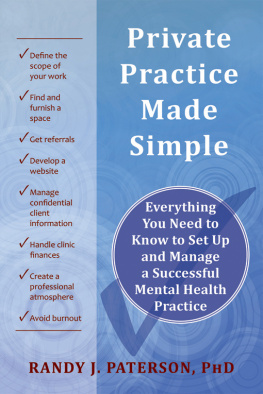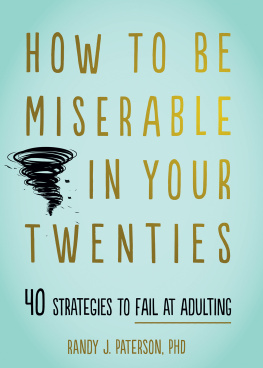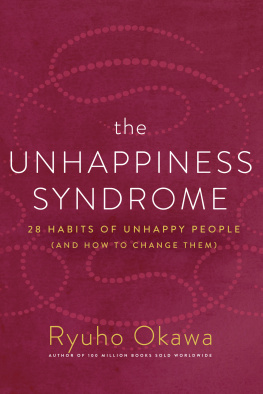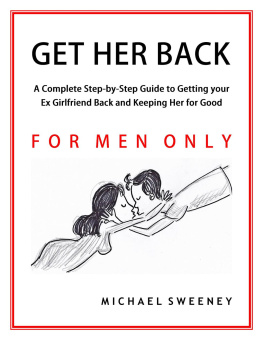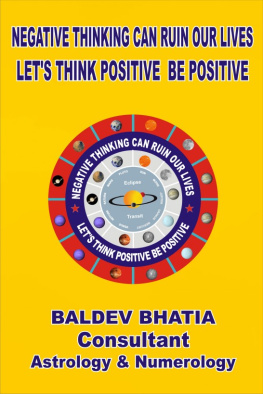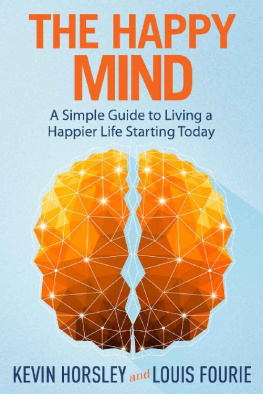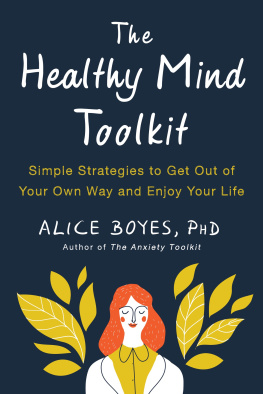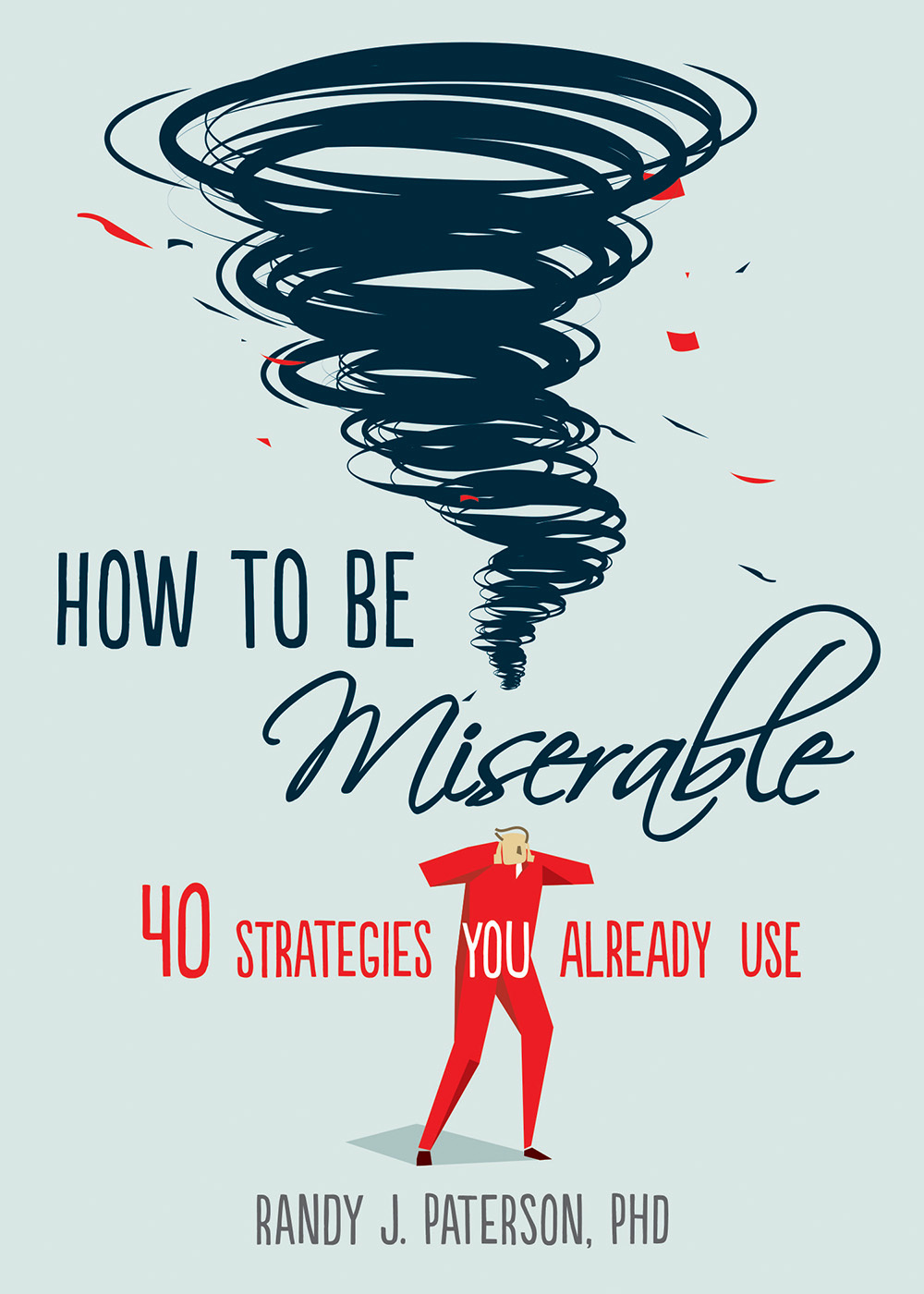
Randy J. Paterson has hit a home run with this highly accessible, engaging book. How to Be Miserable uses tongue-in-cheek humor, scientifically grounded practical advice, and a healthy dose of what is colloquially known as reverse psychology to help put an end to common behavioral patterns that contribute to unhappiness. Anyone who wants to be less miserable should read this book and do the opposite of everything it recommends!
Martin M. Antony, PhD, ABPP, professor of Mpsychology at Ryerson University in Toronto, ON, Canada, and coauthor of The Shyness and Social Anxiety Workbook and The Anti-Anxiety Workbook
Randy J. Patersons How to Be Miserable contains practical, witty, and wise advice, and is based on the premise that we have become our own worst enemies. Confronting our management strategies consciously is the only way our life actually begins to turn toward better outcomes.
James Hollis, PhD, Jungian analyst, and author of The Middle Passage and Finding Meaning in the Second Half of Life
Randy J. Paterson has failed miserably in his quest to create a recipe for unhappiness in How to Be Miserable, and instead has written a gem of a parody on how to cope with the inevitable difficulties we all must face in order to live a happy and fulfilling life.
Simon A. Rego, PsyD, ABPP, associate professor of clinical psychiatry and behavioral sciences at Albert Einstein College of Medicine/Montefiore Medical Center in New York, NY
How to Be Miserable is a different kind of self-help book. By learning the forty traps that lead to unhappiness, readers will actually discover how to create the life theyve always wantedone filled with lasting happiness.
Matt McKay, PhD, coauthor of Thoughts and Feelings
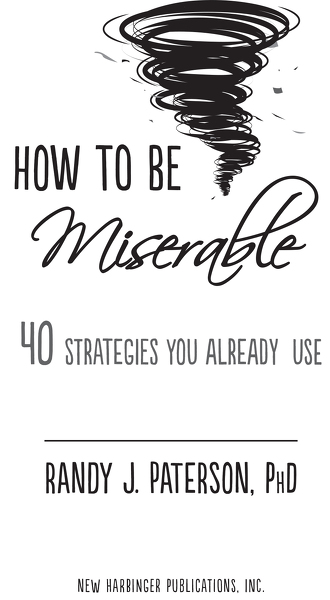
Publishers Note
This publication is designed to provide accurate and authoritative information in regard to the subject matter covered. It is sold with the understanding that the publisher is not engaged in rendering psychological, financial, legal, or other professional services. If expert assistance or counseling is needed, the services of a competent professional should be sought.
Distributed in Canada by Raincoast Books
Copyright 2016 by Randy J. Paterson
New Harbinger Publications, Inc.
5674 Shattuck Avenue
Oakland, CA 94609
www.newharbinger.com
Cover design by Amy Shoup
Acquired by Melissa Kirk
Edited by Jennifer Eastman
All Rights Reserved
Library of Congress Cataloging-in-Publication Data on file
For Benjamin
A pack of blessings lights upon thy back;
Happiness courts thee in her best array;
But, like a misbehaved and sullen wench,
Thou poutst upon thy fortune and thy love:
Take heed, take heed, for such die miserable.
Shakespeare, Romeo and Juliet
The greatest happiness is to know the source of unhappiness.
Fyodor Dostoevsky
Contents
The Dreams of Another Age
H undreds of self-help books are published every year. Each one, directly or indirectly, has the same purpose: how to make you happy. How to get rich so youll be happy. How to be thin so youll be happy. How to overcome depression so youll be happy. How to find a relationship so youll be happy. How to have high-colonic enemas so youll be happy.
There is an irony in these extensive, groaning shelves. The very fact that there are so many of these books suggests that the target is extremely elusivethat happiness isnt easy.
Conjure in your mind the image of a caveman.
In your vision, he probably looks rather stupid. But he is us. Our species, Homo sapiens sapiens, has been around in pretty much the same form for over a hundred thousand years. And, stupid or not, our caveman has dreams. He longs for a world in which good-tasting food is readily available and starvation is unlikely. He wants freedom from the predators that occasionally make off with members of the tribe. He wants his children to stop dying from diseases he does not understand. When he is himself ill, he wishes that someone would help him get well.
Then he shakes his head, frowns at himself for wasting time, and returns to the business of survival. Pointless to wish for a world that could never exist.
But it canand does.
In the developed world, we live a life of luxury unparalleled in the history of the species. Theres food in the fridge, theres a roof over our heads, theres hot water in the faucet, theres hot air in our furnaces and leaders, and every product we can think of is within reach. We have a longer life span than ever. Were healthier for longer. The neighbors are not, for the most part, trying to kill us. The infant mortality rate is low, and the lifespan is long.
It is a world that our caveman, and the kings of not so very long ago, would quite happily have killed for (and one which the present-day citizens of many less privileged nations dream about). If we could reach back in time and bring our ancestors to the present world, their eyes would widen in amazement. We would show them our cars, our aircraft, our hospitals, our grocery stores, and the climate-controlled rooms where we sit in comfortable chairs to do our work.
They would stare at us with a sudden realization. Ive died. This is the promised realm our priests talked about. Your days are spent in comfort and bliss. Can I stay?
Then you tell them that there is a blight in this paradise. Most people are not filled with joy. Many spend much of their time in a state of dissatisfaction. Some are hospitalized in deepest misery. Millions are given medication to lift their moods to a tolerable level. Publishers bring out hundreds of books on how to find the happiness that microwave ovens and stable societies and Zumba classes have somehow failed to provide. Bus shelters advertise distant destinations to which the inhabitants of this world can escape.
Escape? Our caveman can think of nothing more wonderful than to be imprisoned here. He doesnt understand. He cannot.
Something has gone wrong.
Misery sneaks up on you.
Many years ago, I was midway through my predoctoral internship in psychology when misery popped by for what turned out to be a yearlong visit.
At first I had no idea what was happening. I couldnt sleep, I couldnt eat, I could barely read a sentence, and a flight of stairs might just as well have been the Annapurna Circuit. Nothing appealed. At times, it seemed I could barely talk. Once, in a depressive fog, I greeted a new patient with the pronouncement, This is Randy Paterson, causing the poor woman to peer around to see if I might be introducing her to someone more promising than I was.
A flippant list of a few symptoms does not serve to illuminate the sheer wretchedness of much of this period. I could go on, but lets leave that for another day.
I was treating depression, for goodness sake, and still failed to notice it overtaking me. When I finally twigged, I was tempted to dismiss it. Young, healthy, pursuing a career Id chosen at the age of eightwhat did I have to be so unhappy about?
The answers, rolling their eyes, eventually tapped me on the shoulder, annoyed that I hadnt noticed them standing there.
Some were outside my control. The internship demanded long hours on multiple wards, seeing patients with both psychiatric and physical illnesses, many of the latter being terminal cases. One of my best friends at the time was dying. My internship was far from the friends Id developed in graduate school, in a bedroom community known chiefly for the cheerful ease with which the residents had evacuated some years before, when a train carrying toxic chemicals derailed. (The miracle, so the local joke went, was not that everyone got out but that they ever returned.)
Next page

